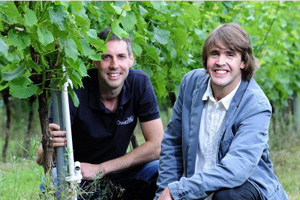The project received an innovation grant from the Natural Environmental Research Council (NERC).
"Microclimates buffer plant community responses to climate change" (in press), Global Ecology and Biogeography: a journal of macroecology
"Fine-scale climate change: modelling spatial variation in biologically meaningful rates of warming" (2016), Global Change Biology
Working with Cornish winemakers to mitigate climate risks
Climate risks and winemaking
Climate risks and winemaking
Researchers at the Environment and Sustainability Institute have been working with Cornish winemakers to develop practical tools to help manage the risks of adverse weather and protect their crops.
Winemaking is a burgeoning industry in Cornwall that has grown dramatically in recent years, but it is threatened by unpredictable weather conditions caused by climate change. Grape vines are highly sensitive to changes in the weather and unexpected frosts can destroy entire crops.
Dr Ilya Maclean, Senior Lecturer in Natural Environment at the ESI, has analysed weather data from the Lizard Peninsular from the past 30 years to create a detailed picture of variations in climate conditions across areas of land such as a vineyard.
The project, funded by an innovation grant from the Natural Environment Research Council (NERC), has used microclimate modelling to produce easy-to-use online maps for vineyard managers, allowing them to zoom in on a part of the landscape and view areas where strong rainfall and frost risk are predicted. This enables them to adapt their planting practices, as well as helping pinpoint potential sites for new vineyards.

There are many myths and assumptions in our industry but every site is different, and what works in the South of France may not work here in Cornwall. The changeable weather means our yields fluctuate considerably year on year. This research could give us important data to inform our practices and help us deliver more reliable yields.
Sam Lindo, Wine Maker at Camel Valley Vineyard, pictured with Dr Jonathan Mosedale. Image by Toby Weller.
Dr Maclean explains: “The kind of scales we’re going down to allow you to look at the climate not just across the landscape, but also within vineyards.”
Two of Cornwall’s existing wine producers, Camel Valley Vineyard of Bodmin and Polgoon Vineyard and Orchard of Penzance, offered Dr Maclean and Dr Jonathan Mosedale access to their vineyards to undertake the study.
Sam Lindo, Wine Maker at Camel Valley Vineyard said: “There are many myths and assumptions in our industry but every site is different, and what works in the South of France may not work here in Cornwall. The changeable weather means our yields fluctuate considerably year on year. This research could give us important data to inform our practices and help us deliver more reliable yields.”
Dr Maclean said: “One of the reasons that we are doing our work is that it can be applied to any agricultural crop that is sensitive to climate. Daffodil growing is a big industry in Cornwall – if we could inform farmers which would be the parts of the landscape where daffodils would flower earliest, that’s going to help them get their product to market.”
